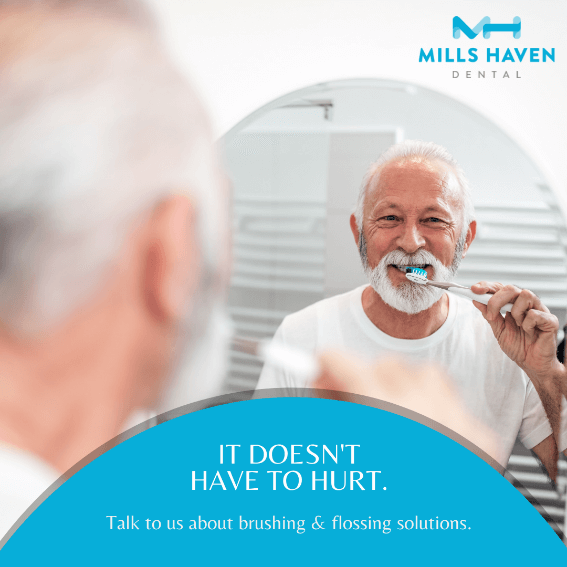3 Tips for Senior Oral Care
January 19 2021 by Mills Haven Dental

Seniors are more at risk for tooth decay and injury, exposed roots, and oral cancer.
The good thing is with each passing year, we make more progress on understanding oral health to better support older Canadians with their oral hygiene.
Keep reading for 3 tips for senior oral care.
#1 Don’t Forget the Basics
Adults at any age should make sure they practice oral hygiene basics. As we get older, sometimes these good habits can be harder to manage.
Here are some tips to help with your regular floss and brush routine:
- Get the right toothbrush.Toothbrushes have advanced in unimaginable ways over the years, and they’re now designed to help with things we didn’t even think about when we were younger. For example, electric toothbrushes have a larger grip to help with arthritic hands. You can also get a double-headed toothbrush to help with dexterity.
- Use flossing tools.Age can make flossing become more difficult. If using your fingers to floss is becoming a problem, look into getting floss threaders or other tools that will make it easier. We are big fans of water flossers, which can take a lot of stress off your hands (they also require less squinting in the mirror).
- Be picky about your products.Toothpaste, mouthwash, and denture cleaners come in different types to meet your different needs. If you have tooth sensitivity or want to remove staining, check out the Canadian Dental Association’s list of approved products.
- Set a reminder.You may find that your memory isn’t what it used to be. It’s important to remind yourself to keep up your oral hygiene practice. You might want to set an alarm or put sticky notes around the house (we find a great place is where you enjoy your morning coffee).
- Your face and neck for moles, sores, or skin discolouration.
- Your lymph nodes and glands for lumps or swelling.
- Your inner cheeks for ulcers and infections.
- Check your reflection for any lumps, sores, skin colour changes, or mole changes on your face and neck.
- Feel both sides of your neck to find any bumps or swelling.
- Remove any dentures or appliances from your mouth.
- Use your flashlight to check the inside of your mouth. Do you notice any discolouration, lumps, swelling, or any other changes in shape?
- Pinch your tongue with your finger and thumb. Pull out your tongue and move it around so that you can inspect all sides. You’re looking for anything unusual.
- With your fingers, explore all areas of your mouth for lumps, swelling, or pain. You’ll want to make sure to check out the roof of your mouth, gums (upper and lower), the inside of your cheeks, and inside your lips, too!
#2 Schedule More Thorough Oral Exams

Preventative dentistry is important for all of us, but it becomes increasingly more important as we age. If you’re a senior, you should see your dentist more regularly. They’ll want to make more frequent checks of:
Now more than ever, it’s important to attend every check-up and not delay your appointments.
#3 Conduct Your Own Self-Exams
Your dentist will perform regular oral cancer screening and exams when you come for a visit, but that doesn’t mean you can’t be extra vigilant! In between visits, we recommend you perform your own self-exams once a month. You won’t need many tools, just a flashlight and a mirror. Follow these steps for your self-exam:
If you notice any changes in your oral health, you should reach out to your dentist or doctor right away.